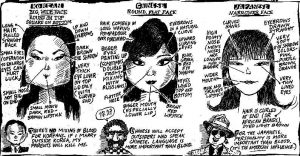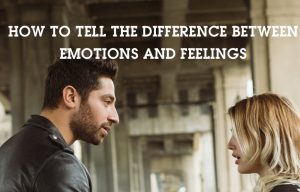 One of the big obstacles that is in your way to growth is not being able to tell things apart, things that are different, but the difference is either subtle, or it is below the water level. Or is confusing because the names from the Tree of Knowledge use the same word for both
One of the big obstacles that is in your way to growth is not being able to tell things apart, things that are different, but the difference is either subtle, or it is below the water level. Or is confusing because the names from the Tree of Knowledge use the same word for both
One of these is going to be important, so I’d like to encourage you to put some energy and effort into telling these two apart: 1
Feelings and emotions.
Why is this important? and why you want to learn what I say and not what others teach… 2
Feelings are on the Tree of Life, where normal evolution of the human species would have us, had we not been encourage to choose the Tree of Knowledge where misery and slavery is our “due” for listening to the Dark Side…
Emotions live on the Tree of Knowledge, and entirely and intimately connected to words, concepts, ideals, all the stuff that sounds good but ultimately will keep you unhappy.
 Why is it so difficult to tell the two apart, feelings and emotions?
Why is it so difficult to tell the two apart, feelings and emotions?
Because you actually feel your emotions too. Margoczi calls them “non-physical pain”… the emotions.
So the real distinctions are these:
Does the feeling come through the 5 hardware-type and 3 software-type need? If it does, wordless, then it is a feeling.
Does the feeling come through some words? It’s an emotion.
Let’s see an example that has been the source of misunderstanding:
When you compare yourself to someone else… and they are smarter, or know more, you experience a devaluation of your I.
You feel pain. Anxiety. It’s hard to breathe. Your throat wants to close.
Is this a feeling of the eight Tree of Life needs? Is it a guiding, orienting, strategic feeling?
No. There were some words… and the words (smarter, dumb, better, not as good, not good enough… whatever your way of expressing being less than…) have a specific marker feeling, more precisely worded: emotion. Tree of Knowledge, 100%.
My students hate me. Much of the time. Hate is an emotion, typically attached to all those “I am less…” words, and I am the messenger to kill.
Some students, in addition, lessen the blow by concentrating on why I am not credible to say bad things about them. Why they are OK and I am not.
On the Tree of Knowledge you don’t want to know anything bad about yourself. Anything that you didn’t already know.
 On the Tree of Life nothing is significant.
On the Tree of Life nothing is significant.
Everything gets translated to feeling…
So what is feeling on the Tree of Life, what are feelings really?
Anything that is independent of languaging, because the information is a primary input through the senses3 independent of words… truly independent. Pre-wording.
Feelings are there to make life, your life, better.
Feelings prompt you to eat, prompt you to stop eating.
They prompt you to go to the bathroom. They prompt you to clean yourself, to rest, to pursue companionship, to choose the right partner for procreation.
No words.
The moment words enter into the equation, you are in the world of emotions, culture, norms, standards, looking good, being well though of, fitting in, smart or stupid.
Even the higher level of needs, Margoczi calls them software type needs, the need to meet the expectations of others (rules, laws, really basic: don’t piss on someone’s child… level), the need to meet your own expectation of yourself: still all about the basics… and the third level of software-type need: the need to self-actualize.
The software type needs are not word-based. They are real needs, and even if we kept you without words, they would be there. Example is Helen Keller, who didn’t have words, but those unfulfilled needs made her frustrated, act out, and unhappy.
Even dogs have those needs, and when they cannot be fulfilled because the owners don’t know about them, the dog is frustrated, and acts dejected.
Same with monkeys kept in a cage… the software based needs don’t find expression in the cage.
But the pain you feel when someone says something smart, or when someone wins a competition, or when someone seems happy… if all word based, and even though you feel it, wherever you feel, they are emotions.
Which makes me think: we should rename the feelings to sensations… What do you think?
PS: I watched a minute here and a minute there of a lot of Ted talks about this topic. What no one seems to know that it is possible to stand outside of the filthy unhappiness making culture, The Tree of Knowledge, and be untouched and untouchable by the artificially invented emotions. When you can feel emotions but you are not trapped by them, you can be happy.
Example is me watching a documentary, and sobbing throughout. Wailing… that is loud sobbing…. lol.
And not be sad. Not be hooked. Not even get hooked when I see that some people call the heroes of the movie enemy combatants.
You see, if this happened to you on the Tree of Knowledge, your I would go through an immediate devaluation and you would either believe that enemy combatant bit, or argue with it… meaning that you don’t trust what you feel… You are a leaf in the wind. An effect. With no steady I. No Self.
And you are, certainly, unhappy… wretched… not understanding what is the cause of your unhappiness.
Is this all you need to do? Just get the difference between a feeling and an emotion to raise your vibration and become happy?
Yes and no.
Depending on where you are in life… All I needed to do. All some of my clients need to do.
And even though this is a magic bullet, in a way, in order to use it, you need to have
high enough vibration
high enough overall intelligence
high enough physical well-being
high enough vocabulary
high enough Twitchy Little Bastard score
Want to find out what are your Starting Point Measurements? You can get all 10 relevant measurements for $15
Once you have those, you’ll know where you are…
1. your vibration (1-1000)
2. your overall intelligence, emotional, intellectual, spiritual, body, relationship, etc.
3. the number of spiritual capacities you have
4. your soul correction (your machine): https://yourvibration.com/sc
5. do you have attachments?
6. the level of your health (1-100)
7. the level of your cell hydration (1-100)
8. your relationship to feedback and instruction
9. The level of discomfort you are willing to allow w/o trying to fix it. This is your TLB score…
10. The size of your vocabulary: the number of words you can use accurately.
- tell the difference between (someone and someone else) (or something and something else) to recognize the things that distinguish people or things
- I was looking on the internet for pictures to make this post lively… and to my horror, I found that everyone says something different about this topic… So your best bet is to forget everything you have elver learned, everything you have everl read, and just follow this article… and call feelings what i call feelings (sensations) , and emotions what I call emotions. The resulting clarity will snatch you from the chaos of the confusing interpretations of moronic hirelings of the Dark side and put you, potentially, on the only place where you can be happy: the Tree of Life
- languaging is a “means to mediate cognition” and “a process of making meaning and shaping knowledge and experience through language”… meaning the words you invent to get you on the Tree of Knowledge

